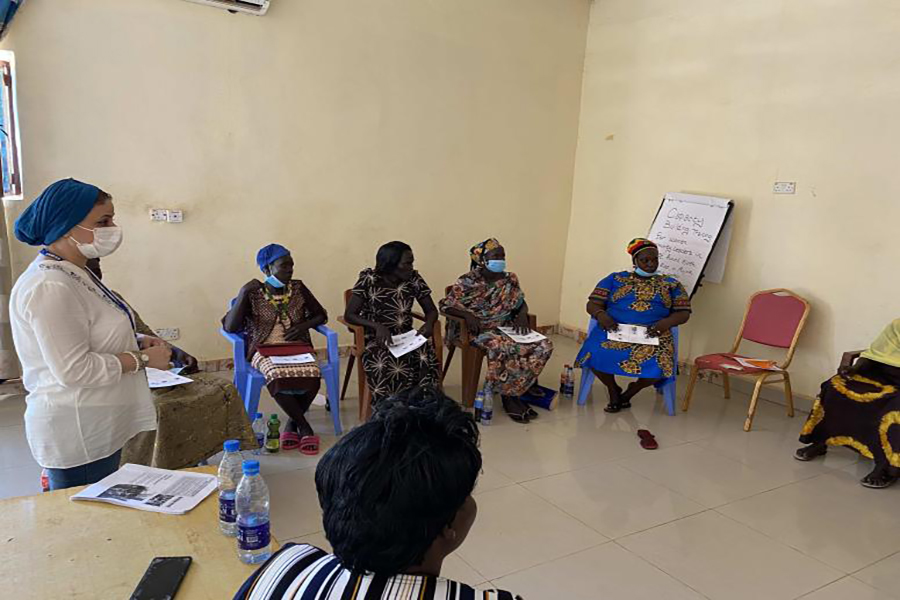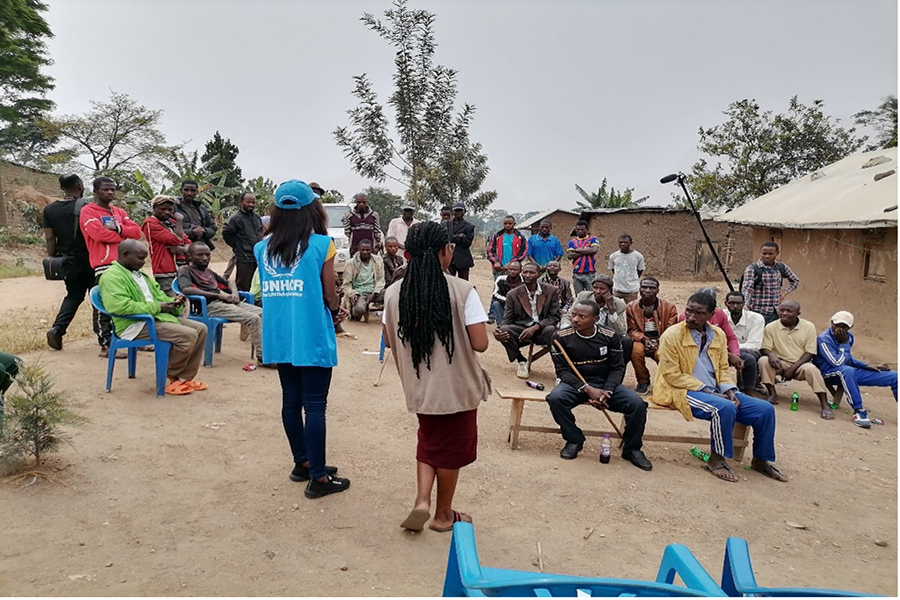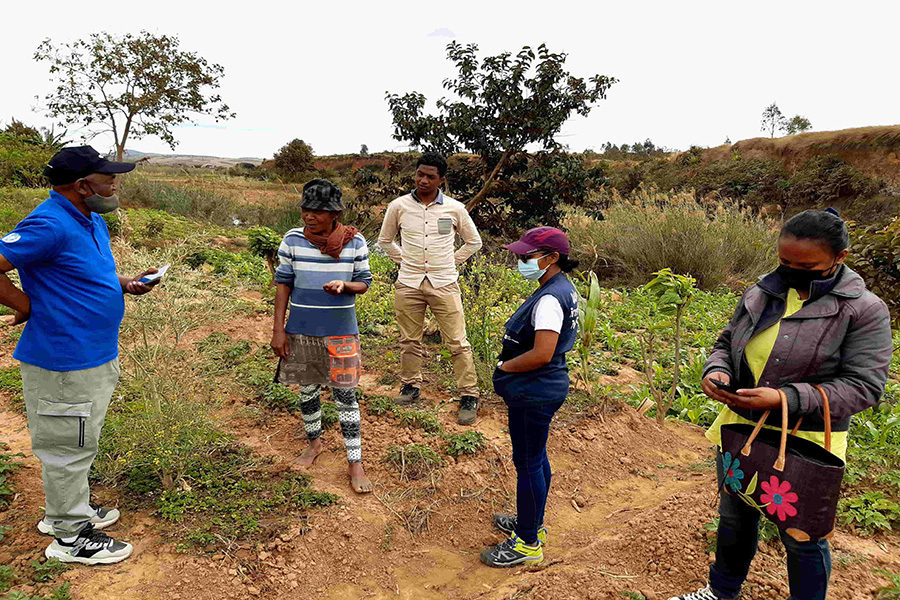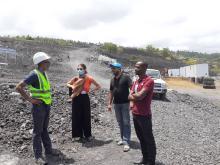Meet four UN Volunteers from the East and Southern Africa region who support women impacted by climate change in their local communities. Below they share their perspectives on why gender equality is important and how to effectively mainstream gender issues into environmental policies and programmes.
Rita Chiara Mele, UN Volunteer Energy Specialist, UNDP Comoros
In Small Islands Development States (SIDS) like Comoros, gender and climate change are deeply interconnected. For instance, in the clean cooking sector, women have limited access to modern cooking services and still use traditional biofuels such as firewood, which cause deforestation and increase community vulnerability to climate change.
As a UN Volunteer Energy Specialist serving with UNDP Comoros, Rita supports efforts to increase the visibility of women working in the energy sector and mainstream gender-sensitive approaches in implementing projects at the UNDP Comoros country office.
I believe that professional representation is an important factor in encouraging women's participation and engagement in our transition to renewable energy. On the other hand, access to intangible resources, such as information and social networks, can facilitate gender equality in the energy sector," -- Rita Chiara Mele, UN Volunteer Energy Specialist, UNDP Comoros
Sarwa Burhan Qader, UN Volunteer Gender Affairs Officer, UNMISS South Sudan
South Sudan is still a deeply patriarchal society where political and social power balance largely tips towards men. Yet, women play significant roles in society, particularly at the household levels. Unfortunately, this patriarchal reality poses substantial challenges to women and girls in the country and exposes them to extreme poverty, limited access to educational opportunities and sexual and gender-based violence.

The emergence of climate change as an environmental issue in recent years has also increased the burden and vulnerability of women and girls in the country, as most of the economic activities impacted by climate change are undertaken mainly by women. For example, many families in Aweil North County are often forced to marry off their young girls to receive dowry due to increasing food insecurity and poverty exacerbated by climate change.
As the head of the Gender Unit for the UN Mission in South Sudan (UNMISS) in the Aweil Field Office, Sarwa empowers women facing climate change issues through capacity building training, advocacy for gender equality and promotion of women’s meaningful participation in political and household decision-making. Sarwa also works with colleagues and local government partners to enhance the protection of women and girls from sexual and gender-based violence and promotes women’s economic empowerment through vocational centers.
I believe that gender equality is very critical in responding to climate change. Women and men should have equal access to information and knowledge on climate change to respond to climate change impacts." -- Sarwa Burhan Qader, UN Volunteer Gender Affairs Officer, UNMISS
Kudzai Mugumbate, UN Volunteer Associate SGBV and Gender Equality Officer, UNHCR Uganda
Kudzai Mugumbate serves as an Associate Sexual and Gender-Based Violence (SGBV) and Gender Equality Officer with UNHCR in Rwamwanja camp in Uganda. Kudzai's role is to support the commitment by UNHCR towards zero tolerance to sexual and gender-based violence to partners and the refugee communities in Rwamwanja. Kudzai also supports women's socio-economic empowerment and gender equality efforts by UNHCR.
For me, it is important that men see women as equals. I am happy that my efforts, and those of other colleagues at the Rwamwanja settlement, are already starting to bear fruits. Most men we have engaged in the settlement have vowed to support their wives and sisters to take leadership positions in upcoming refugee leadership elections." -- Kudzai Mugumbate, UN Volunteer Associate SGBV and Gender Equality Officer, UNHCR Uganda
To mark IWD 2022, Kudzai is mobilizing men, women, boys, and girls in the Rwamwanja settlement to promote gender equality and women empowerment. Additionally, Kudzai works with women leaders to promote the role of women in climate change adaptation, mitigation, and response. "Together with groups of equal representation of men and women, we encourage planting fruit trees to conserve the environment while increasing dietary diversity at the household levels," explains Kudzai.

Larissa Milantosoanandrasana, UN Volunteer Agronomist, UNDP Madagascar
Climate change has had devastating impacts on communities in Madagascar, more so for women and girls. For instance, in the Southern regions of the country and the low-lying parts of the capital, Antananarivo, flooding and the recent cyclones have brought devastating impacts. From increasing water scarcities to food insecurity, women and girls have often found themselves in the middle of climate disasters in the country. This is primarily due to their societal roles at the household levels, where they are responsible for the provision of basic necessities such as food and water while taking care of children.
As a UN Volunteer Agronomist, Larissa supports UNDP's strategic and operational efforts towards mitigation and adaptation to the effects of climate change in the country. Larissa works with colleagues to help vulnerable households and farmers practice climate-resilient agriculture. "To diversify economic activities for women beyond agriculture, we have trained several women groups on installation, maintenance and repair of solar equipment and invested in renewable energy value chain business opportunities for them," explains Larissa.
As a United Nations Volunteer, I am very proud that I have been able to support communities to become more climate-resilient and empower women to take up their rightful positions in society. For me, this is more of a deep sense of duty for my country." -- Larissa Milantosoanandrasana, UN Volunteer Agronomist, UNDP Madagascar


